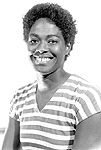
Patriot Pride
Alumni Coaches Root for the Home Team
By Sabrina Tillman
A Value-Added
Bonus Although Mason alumni may have an advantage as coaches once
they are hired, they are not given special consideration during the hiring
process. "It's always an open search, and alumni status is not used as
a hiring criteria," says Tom O'Connor, director of athletics. But O'Connor
describes alumni status as a value-added bonus. "These coaches know the
university, they have a great passion for the university, and having been
Mason students, they understand what the university is all about," O'Connor
says. Coaches with other alma maters can be just as successful as alumni,
but Mason grads understand the experience here at George Mason better
because they lived it themselves, he says.
Pat Kendrick,
B.S. '82, is the most successful women's volleyball coach in Patriot history.
As a student, Kendrick was a two-sport Patriot star as one of the top
players on the women's volleyball team, as well as the university's first
conference champion in track and field. Like Debbie Taneyhill, Kendrick
began coaching right after she graduated. "I never really left George
Mason," she says, after 17 years coaching. Kendrick uses her firsthand
knowledge of the university on a regular basis to recruit athletes.
Bill Brown,
B.S. '80, says having been a student here makes it that much easier to
come back to work for the university. "Right from the start you have a
pretty good feeling about what you are getting into," Brown says. "You
can never walk away from the fact that you are an alum, and you take pride
in putting out the best possible product," says Brown. In Brown's 18 years
as a coach, 19 Patriots have been drafted and signed by Major League Baseball
clubs, and several others have been signed as free agents. Brown says
there will always be a bond between past, current, and future players.
"Ultimately, you are all part of the same fraternity¬that being George
Mason baseball."
More Than a Job
Women's basketball coach Debbie Taneyhill, B.A. '92, M.A. '97,
began her coaching career with George Mason as an assistant just after
graduation in 1992. Three years later, she was promoted to associate coach,
and in 1998, she became the head coach.
"Being an alumna
makes coaching here much more than a job for me," Taneyhill says. "I have
a history with this university, and to see the strides that George Mason
has taken over the years is very rewarding for me," she says. When Taneyhill
played, the women's team competed in the P.E. building. "We've added a
lot of facilities since then, and it's great to be able to see the programs
grow with the school."
History in the
Making Associate athletic director Kevin McNamee says, for
alumni coaches, the job goes far beyond a working commitment. "It's a
living commitment¬they are a little more attached because they played
here, they competed in the program, and they helped create the legacy
of the program," he says.
A legacy is just
what women's soccer coach Jac Cicala, B.S. '75, M.S '88, has created.
When Cicala was a Patriot defender in the early 1970s, George Mason didn't
have a women's soccer team. In 1982, he returned to help launch the program.
Over the next 10 years, Cicala served two separate seasons as an assistant
coach with the Patriots and coached for local high school teams until
1992, when he assumed the role of head coach.
Wrestling coach Brian
Shaffer, M.Ed. '92, is an alumnus but did not play for the Patriots
during his undergraduate career. Shaffer wrestled at the University of
Pittsburgh and later coached at American University before coming to George
Mason. In just a few years as a Patriot coach, Shaffer has observed one
thing about the Patriots: "History and tradition are a big part of George
Mason athletics."
George Mason alumni who return to their alma mater as coaches may be the
Patriots' most committed fans. They returned to make coaching their career¬and
in doing so have made it a lifestyle. George Mason alumni coaches have a
special relationship with the school¬they have a hand in its past,
present, and future. Currently, the Patriot coaching staff has 6 head coaches
and 14 assistant coaches who are George Mason alumni, a high number considering
other universities in the Colonial Athletic Association average only 7 alumni
coaches.



| George Mason Alumni |
| Head Coaches |
| Bill Brown, '80,
baseball Fred Chao, '94, men's volleyball Jac Cicala, '75, '88, women's soccer Pat Kendrick, '82, women's volleyball Brian Shaffer, '92, wrestling Debbie Taneyhill, '92, '97, women's basketball |
| Assistant Coaches |
| Tony
Barton, '93, women's track and field John Curtis, '93, wrestling Greg Franzke, '93, men's soccer Marcell Harrison, '94, women's basketball Kim Maslin-Kammerdeiner, '88, women's soccer Martin Nachtman, '96, men's soccer Jaime Pagliarulo, '99, women's soccer Liz Robertshaw, '98, lacrosse Jeff Rockwell, '98, volleyball Mark Ryan, '98, men's soccer Simon Targett, '99, tennis Chris Tischler, '98, volleyball Mario Vernon-Watson, '95, men's track and field Sue Vodicka, '86, '92, women's soccer Mark Weader, '99, wrestling |
| In the Colonial Athletic Association, George Mason tops the league with the most alumni coaches | ||
| George Mason | 6 head coaches | 14 assistant coaches |
| James Madison | 6 | 7 |
| William and Mary | 4 | 6 |
| Old Dominion | 3 | 6 |
| Virginia Commonwealth | 3 | 5 |
| East Carolinia | 2 | 4 |
| UNC at Wilmington | 4 | 1 |
| University of Richmond | 0 | 3 |
| American | 1 | 1 |